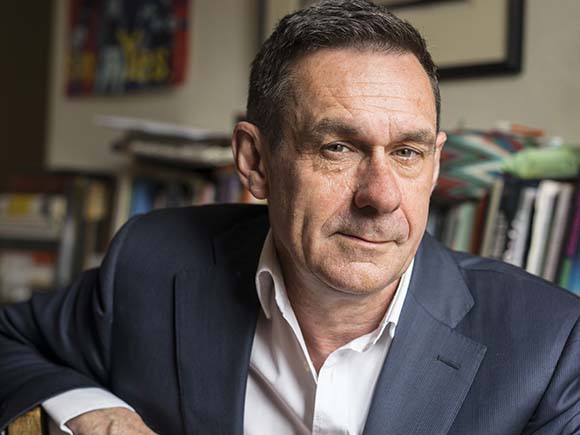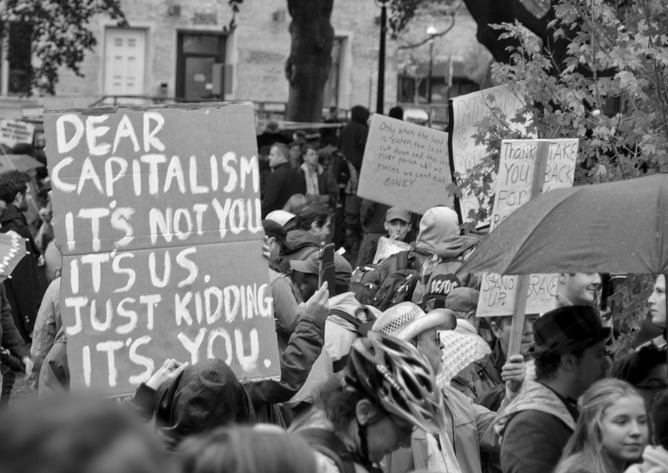
On finishing Paul Mason’s Postcapitalism: A Guide To Our Future, I feel elated. But why? The majority of this book is a history of left and right-leaning economic theory, accompanied by an analysis of how societal, environmental and political events affect our understanding of present day capitalism, and thus modern global goods and services production. This is not a topic which usually engenders elation in me, seeming, as it does, to rub salt into the proverbial and collective wound.
Then it hits me. I feel elated because, fundamentally, this is a book about hope, a word we all seem to have substituted for the word ‘naivety’. I feel elated because within this hope is also detail, analysis and suggestions for eventual outcomes, as well as elements for transition stages, couched in a language that challenges me to find better versions of this hope for myself. Mason tells us that here is not the answer, but merely a signpost to what in all likelihood will be a modular, solution-focussed framework through which new answers can be found and realised.
This is a book which acknowledges the development and evolution of capitalism over the last 200 years, as both an economic and a social system of norms and values. Mason then wrestles with the grand provocations of our day, the challenges which our generation and the next will be judged upon: climate change and the 2°C target, which we are currently on track to miss by a country mile, the ever-increasing gap between rich and poor, the void between production cost and unit price, moral questions behind new technologies, and the collective structures by which we organise and produce as a globe and as individuals.

Before picking up this book, I should warn you that contained within is the word ‘Marxism’. Do not be afraid. It is as much a critique of Marxist economic theory over the last 100 years as it is a critique of neoliberalism. The answer, as Mason prompts us, is not to be found in traditional concepts of left and right, but in thinking of something entirely new. Mason terms this ‘Post Capitalism’, and in doing so elevates the debate around our future to a search for answers that lie outside the narratives of our past: basic income, the sharing economy, open source software – and, by consequence, changes in intellectual property rights – and the universally educated human being, as opposed to archaic definitions of class, to name but a few examples.
In preparing for this review, I read a piece by Liam Halligan in the Telegraph which describes this book as “deeply misguided”, while referring to Gaza as “an economic hotspot”. In discussing Mason’s enquiry into online resource sharing, he suggests that Wikipedia’s 27,000 strong volunteers are only able to donate their time because of a subsidy from their parents. I would like to see his evidence for this short-sighted generalisation of the sharing economy. Halligan goes on to say that Mason’s “prescriptions… are vague and unrealistic”, without bothering to offer the reader any detail or insight into the ideas themselves. I can only assume that this is a preference for ‘the devil he knows’.
I also see this determination to pigeonhole Mason’s thoughts in a Guardian review by Chris Mullin (ex Labour MP): “At no point on this long road are there any references to the impact of majority affluence on politics in the developed world.” Mullin here illustrates his desire to view Mason’s global futurology within the confines of current centre-ground politics, like a man resolutely arguing the expediency of feudalism at the dawn of the Industrial Revolution. This book it seems, somewhat bizarrely, is deemed a threat to the establishment media, simply for, as Noam Chomsky might say, discussing ideas outside of the currently accepted spectrum of debate. It is therefore – for this reason alone, whatever your beliefs or hopes for the future – worth a read.
Like all good books, Postcapitalism equips the reader with conceptual tools through which we can better understand ourselves and our place in history. It is an extraordinary vision. Whether we take it on board or not, it is entirely up to each and every one of us. But to dismiss new ideas for change and development when faced with the endemic poverty of the current system is madness and arguably indicative of something far more sinister. We face real challenges as a species going forward, challenges which we are not currently set up to deal with. I, for one, want to know what options we have, however difficult they may be to realise.

The late, great poet Sylvia Plath once wrote of the transience of the present, and in doing offered us a challenge: find the language of the future, find our words for joy, and in that joy find purpose, lest we become confined by a binary understanding of our existence. The future is not left or right, nor is it one size fits all. The future is our responsibility. We must define it and reach for it together.
A smile fell in the grass.
Irretrievable!
And how will your night dances
Loose themselves. In Mathematics?
Words: James Lock.




There is an interesting movement amongst cities worldwide which are community based & often cooperative. The mass production of products leading to waste will have to change as the planets resources diminish, as will the idea of continual renewal of products & rebuilding buildings for no real reason other than it appears “modern”. Old Capitalism and shrinking resources doesn’t work. If Capitalism does survive it will have to have restrictions and there be more focus on Indy businesses which are local & able to adjust to local conditions. Will it happen? I don’t know. I hope so. At present within the city we have several chain food suppliers all competing for the same consumers which means they are overstocked & pushing down the payments to their suppliers who in turn are over producing just to make ends meet. It is not sustainable.
Hi Joyce, those are certainly some of the challenges and while Sheffield in comparison to a lot of other cities in the UK does a lot better in cultivating independent traders over corporates there is still clearly a lot of work to be done.
Personally i’m fascinated by this notion of the changing relationship between production cost and unit price, as information and design as opposed to labour become more dominant within global goods and services production. I don’t see how Capitalism given that one of it’s central tennents is intellectual property right can hope to accomodate the rise in open source and sharing economies.
I geuniely feel, despite the current hardships of a right leaning economic and politcal system, that we’re on the cusp of something potentially utopian at the moment – exciting times.